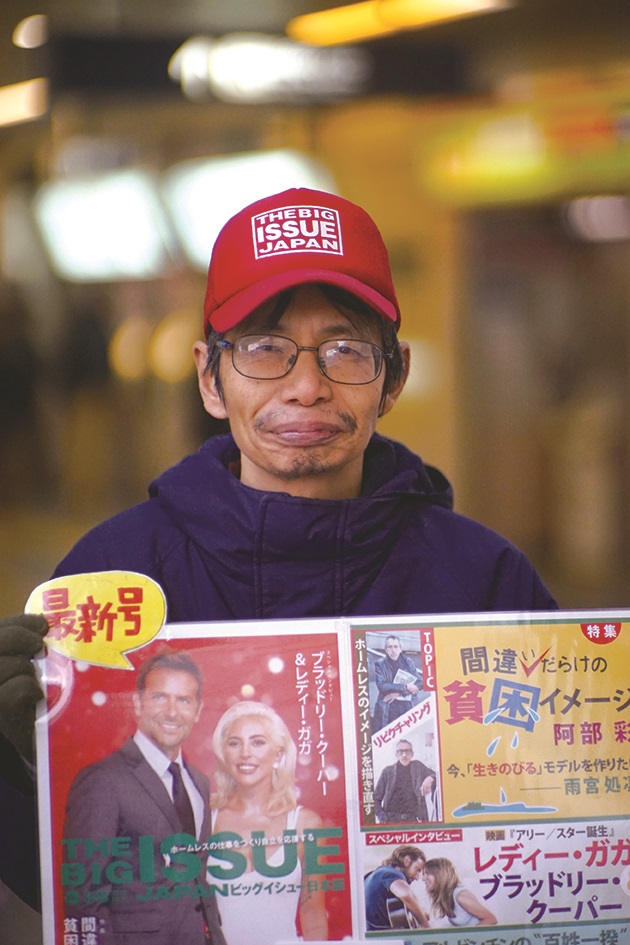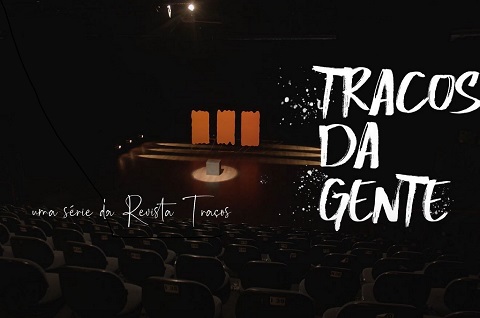By Kazuhiro Hieda, The Big Issue Japan
“Sales fell dramatically back then, and I became fed up with everything.”
Naofumi Mima (55), who sells newspapers at Hankyu Hotarugaike Station in Osaka, is looking back at a time when he suddenly decided to leave The Big Issue. This was around 2011, when he was a vendor in the Umeda district of Osaka. At that time, construction work for the renovation of the Hankyu department store had begun nearby and sales of the magazine halved due to the sudden change in the flow of people walking past. A few years later, Mima returned to the streets as a vendor. Sales were still poor, and he decided to leave The Big Issue.
“Not being able to continue in one job was of course a problem in itself, but my communication skills were poor to begin with, and I would overthink anything anyone ever said to me and feel disheartened by it,” Mima says. “I’ve been told by a psychiatrist that I have social anxiety and even now I struggle to think of what to say when meeting someone for the first time.”
After a few attempts, Mima returned to working as a vendor again in August 2018 and he is continuing to work as a vendor this year from his pitch at Hankyu Hotarugaike Station. Thinking he had caused too much trouble already and would not be allowed to rejoin The Big Issue, Mima encountered a young staff member who promptly told him, “Come back! Everyone’s been waiting for you.” However, unlike in the past, The Big Issue of today seems busier, and it is harder to get to speak to the staff. The only way Mima feels he can repay the company’s kindness is by selling magazines, but even that is something he can’t really control – which can be frustrating.

“I think it boils down to what the vendor makes of the opportunity that The Big Issue provides. There are meetings where vendors can voice their opinions, and some come along with suggestions of what they’d like to do,” Mima says. “If you ask, they’ll even be able to tell you how to make publicity posters or tell you what clothes suit you best!” he laughs. “The rest is just up to however the vendor wants to do it.”
The environment on the sales floor these days – that is, the street – is also different to what it once was. “Although regular customers do stick around and give me a chance to live at least at the bare minimum, other passersby can be cruel with their words,” Mima admits. Being sniffed at or ridiculed loudly – or even told to “go die” by primary school students: these are things that he has had to tolerate. Despite this, Mima makes the best of his situation: he writes a pamphlet every month and hands it out with the magazines he sells. As well as reporting on his own wellbeing, Mima includes an interesting fact or researches the history of a specific area. He has also, through a process of trial-and-error, been trying his hand at senryū – a humorous Japanese poem about the eccentricities of human nature.
“I enjoy creating the pamphlet: thinking about what to write next, or what will make people happy,” Mima says. “Sometimes it takes me more than half the month to produce it, but one person telling me they enjoyed it is enough to bring a smile to my face and keep me going.” Mima secretly hopes that someone will appreciate the over 100 senryū he has written and compile them into a single volume of poetry.
“I know that for every bad thing that happens, something good might happen, too”
It has already been more than 20 years since Mima first became homeless. At the moment he is living in housing, but his outlook for the future is different to what it once was.
“When I first came to The Big Issue, I thought I had to save up and find a job as quickly as possible,” Mima explains. “But someone said to me: ‘Simply getting a job isn’t the answer to independence.’ It’s the fact that I struggled to acclimatize to society that landed me on the streets in the first place, so I’m not confident that I would do all that well even if could immediately reintegrate into the community right now. So my goal at the moment is to be able to live a life where I’m able to pay rent and utilities with the money from the magazines I sell. Some might call it being passive, but I like to think of it as just another form of independence.”
And lastly, what does he think when he looks back on his life so far? Mima ponders the question for a while before answering.
“I think I’ve become more positive,” he tells me. “The amount I can sell changes every day. Even if yesterday went well, today might be terrible. The person I was before would immediately have felt hopeless and given up for the day. But now, I know that for every bad thing that happens, something good might happen, too. With this attitude, for some reason or other, the magazines seem to almost start selling themselves!”
Translated from Japanese by Maia Hall




















